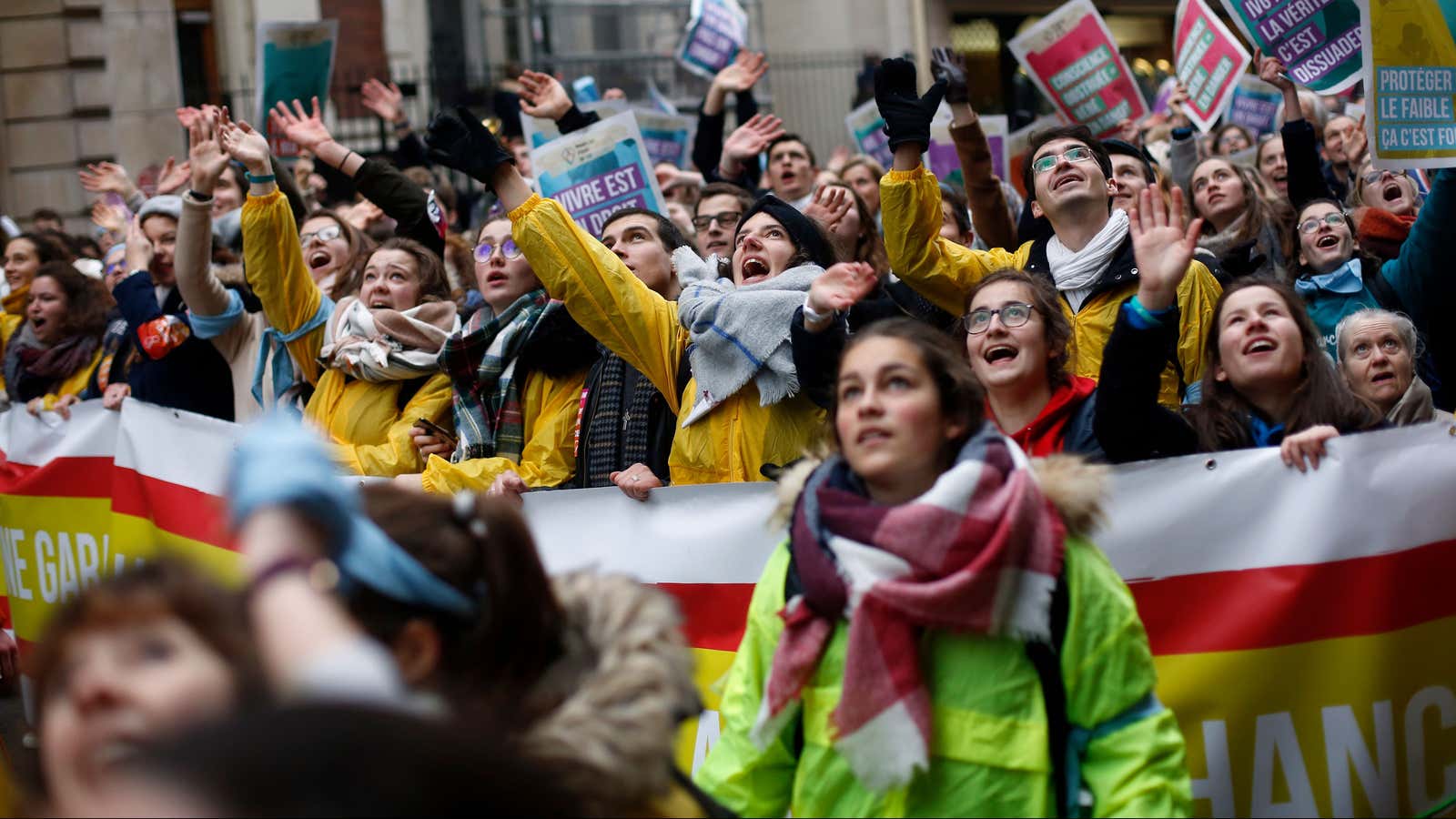On Saturday (Jan. 19), 84,000 yellow vests showed up for the movement’s 10th consecutive weekend of protests across France. One day later (Jan. 20), more than 7,000 people (link in French) joined the March for Life in Paris to protest “the trivialization of abortion.” As many journalists noted (link in French), some of the anti-abortion protesters also wore yellow vests.
That’s hardly an accident. Social-conservative leaders have spent weeks making a case that their demands overlap with those of the yellow vest movement, essentially co-opting the movement’s platform to protest abortion, the use of assisted reproductive technology, and same-sex marriage. Jean-Frédéric Poisson, the president of the minority Christian-Democrat Party, posted a video entitled “Yellow vests, March for Life: same fight!” Nicolas Sévillia, director of the Jérôme Lejeune Foundation, a group that funds research into Down syndrome, told Le Figaro (link in French), “like the Yellow Vests, we denounce the contempt of politicians for citizens.”
Although France legalized abortion in 1975 and gay marriage in 2013, a subset of mostly Catholic social conservatives has long challenged these rights, and regularly mobilized over the years in favor of a more “traditional” view of marriage, gender, and parenthood. Some activists say both movements—social conservative and yellow vest—are fighting to place human dignity at the center of French politics. As a group calling itself the Catholic Yellow Vests explained:
“For nine weeks, the Yellow Vests have tirelessly denounced the…government’s scorn for French people. But the most fundamental contempt, the first cardinal contempt on which all other injustices lie, is the contempt of human life. How do you expect a society that does not respect human life when it is in its beginning to respect human life that works, travels, votes, pays, learns, cares, educates?”
Social conservatives also claim that they, like the yellow vests, have been left out of the democratic process. That’s because Macron’s government has repeatedly stated that it will not discuss abortion and same-sex marriage rights as part of the grand national debate it launched earlier this month.
“The crisis of the yellow vests is a crisis in democracy,” Fabien Bouglé, an anti-gay-marriage activist, told LCI (link in French). “And we were the first to experience it.”
Social conservatives have tried to use the yellow vests’ outsized platform to attract attention to their cause. When the French government’s Economic and Environmental Council opened an online consultation for citizens to register their grievances, anti-gay-marriage activist groups mobilized (link in French) and flooded the site with proposals. In the end, the two most popular demands proposed repealing the law that legalized gay marriage (links in French) and implementing more family-oriented policies—including by giving women a “maternal salary” that would allow them to stay home with their kids instead of work if they wanted to.
A window into the future?
The union of religious conservatives and a grassroots, blue-collar social justice movement may be surprising to some. But according to political scientist and historian Mark Lilla, it’s part of the emergence of “the new French right” (paywall). This young, right-wing intellectual elite “predictably reject[s] the European Union, same-sex marriage, and mass immigration,” he writes, but also rejects “unregulated global financial markets, neoliberal austerity, genetic modification, consumerism, and AGFAM (Apple-Google-Facebook-Amazon-Microsoft).”
Today’s young social conservatives are still Catholic, anti-abortion, anti-immigration, and Eurosceptic, but they are also staunch environmentalists and believers in wealth redistribution. In that sense, it’s not hard to see how they might overlap with the yellow vests, whose demands include raising the minimum wage, reducing taxes on the poor, and increasing taxes on large companies and banks.
Thibault is the perfect example of this phenomenon. The young protester was interviewed at the March for Life wearing a yellow vest that bore the symbol of a far-right Catholic group. He explained that “between the yellow vests and this March for Life, there is a constancy, which is the fight against commodification, against finance, against an imposed materialistic life, and a spiritual denigration.” This, he went on to say, “explains why so many people who did the yellow vest protests yesterday came back to Paris today…to go to the March for Life.”
Critics warn that social conservatives’ views are racist, homophobic, and sexist. The vision of a more “traditional” society centered around the nuclear, heterosexual family is also at odds with the views of most French people (links in French). But that doesn’t mean France’s new social conservatives should be deemed irrelevant.
For one, their next big fight is coming. The French government is preparing to update an existing bioethics law (link in French) in order to offer reproductive technology to lesbian couples and single women, and allow egg-freezing for fertility purposes. Social conservatives have already seized the unique political moment created by the yellow vests to lobby against those changes.
